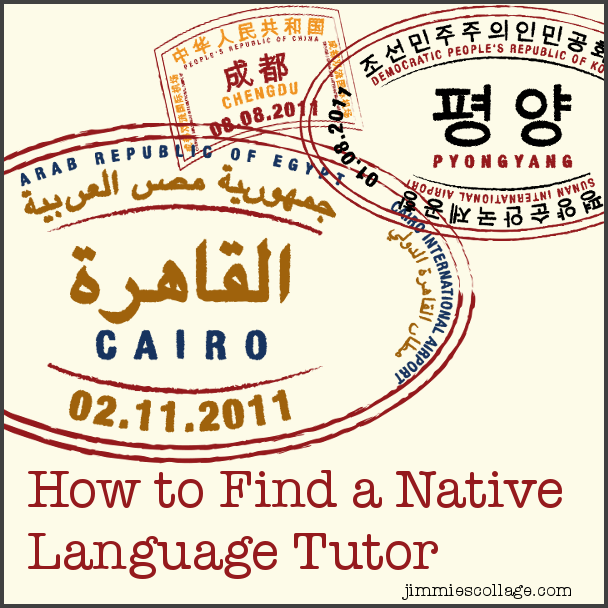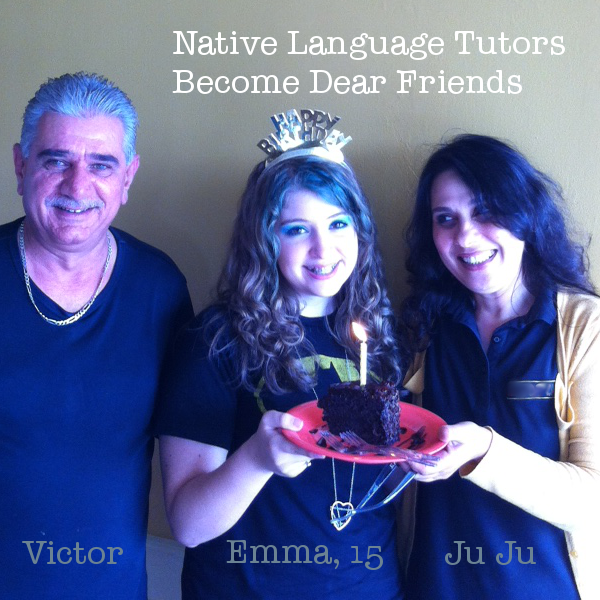
Emma is studying Arabic for her high school foreign language requirement. The child loves languages, and even if it weren’t a requirement in Tennessee, I’m sure she would still choose Arabic or some other language as an elective. It is probably due to growing up bilingual in China, but she aspires to be a polyglot. (We moved to China when Emma was three and lived there for 8.5 years.)
I have bought her Rosetta Stone, and she’s dabbled in Mango languages (free through our library system). But there is no substitute for a native speaking tutor to provide one on one instruction. I’ve found language tutors in China as an ex-pat, and I’ve done the same here in America. For China, we mostly hired college students. But in America the situation has been different for both of Emma’s Arabic tutors.
Dahlia, the first Arabic tutor
Our first tutor was discovered quite serendipitously! I had done some preliminary research for some of the types of places I list in this post. I was making a note of different places to visit in person or to call. But before I started reaching out, I encountered a woman with dark eyes and a headscarf coming out of the Walmart grocery store one rainy night. I boldly approached her with my request, and as God’s providence arranged, she was an Arabic teacher in her mosque. I declined her invitation to enroll Emma in group lessons at the mosque, preferring a more controlled environment and one on one instruction. And that was the start of tutor number one, Miss Dahlia, an Egyptian native.
Miss Dahlia had two young children, and her husband was a university student. She was an excellent teacher and demonstrated true grace, generosity, and patience. She was a devout Muslim, even stopping to pray during one lesson. So Emma received more than just language learning. We ate special cookies and observed how she interacted with her husband and children. The cultural aspect was a huge part of what I wanted from a native language tutor, and Miss Dahlia delivered! Unfortunately, after just a few months of lessons, she and her family went back to Egypt for an extended stay. So we started the hunt for a second tutor.
JuJu, the second Arabic tutor
JuJu is older than I am, a gorgeous Egyptian woman who is very different from Miss Dahlia. JuJu does not wear a head covering and does not go to mosque regularly. She is gregarious where Dahlia was reserved, calling Emma habibti or darling/my love.

JuJu and her husband own an ice cream shop very close to our home! And we encountered them through our normal shopping and dining in our suburb community. Sometimes they tag team Emma’s lessons, so she gets the benefit of an extra point of view from Mr. Victor.
As you can see from the photo, Emma enjoys her lessons so much that she wanted to go on her birthday and is still studying through the summer.
Maybe your don’t bump into Arabic women at your grocery story or your ice cream shop. If not, try some of these other spots.
Check with Local Colleges and Universities
International students at your local college or university might be willing to teach your children. They probably will not have their own transportation, so you may need to arrange the lessons on campus or somewhere nearby.
Hangout at International Groceries and Aldi
Look at message boards at the entrances of international food markets or place your own ad. Ask the employees there. Or go there to shop, and strike up a conversation with customers who look like they might speak your target language. In Memphis, I notice that there are a lot of international shoppers at my Aldi stores. So give that a try too! Obviously the internationals are very frugal like me when it comes to food shopping!
Contact Houses of Worship
Look for mosques, temples, or ethnic community centers as a starting point for finding a tutor. In my experience, most people are very flattered that you have an interest in their language and culture. They will go the extra mile to help you find someone who can teach your child.
Look for Weekend Classes for Children of Immigrants
Chinese people are especially keen on maintaining a grip on their native language, and most cities with a large Chinese population will have Saturday schools where children can learn Chinese.
Tell Everyone You Know
You never know who knows someone, so be sure to tell everyone you know that you are looking for a language tutor. One thing can lead to another, and you may find the perfect match. Even the starting points above might not actually pan out but might lead to someone who knows someone who can serve as a tutor. Be willing to take a few detours on your path. It’s not as easy as hiring a math tutor, but it can be done!
Tips for Working with a Language Tutor
Once you find a potential tutor, be careful how you approach the arrangement. Start with a trial period so both parties don’t feel any unnecessary sense of commitment until you are sure the personalities and teaching styles match.
1. Talk about money upfront.
Don’t be embarrassed. Just spit it out, “I’ll pay you $20 per hour.” For both of Emma’s Arabic tutors, they agreed to $20 per hour but always taught her for 90 to 120 minutes and wouldn’t take a dime more for each lesson. Than ends up being closer to $12 per hour. Don’t be a cheapskate. Honor your tutor and she will be good to you.
2. Choose a good location.
For lessons with Dahlia, we met at her home. In the beginning, I sat on the couch while they were in the dinette area. After we established trust, I would leave Emma there and hangout at the nearby McDonalds for free WiFi while I worked. With JuJu, Emma has her lessons in the ice cream shop during early hours before the lunch rush. Just like before, I stayed with her for a lesson or two. And when she felt comfortable, I started dropping her off. Emma was 14 and now 15 for these lessons, so obviously age makes a difference. When Emma was younger, we always had tutors come to our home.
3. Meet as often as you can.
We scheduled weekly lessons, but if we could do shorter, more frequent lessons, I think it would be better in terms of language learning.
4. Don’t rule out non-teachers.
In my experience, the best language tutors are those who aren’t teachers. This is probably because our language learning goals have always been focused on oral communication. For that goal, you need a teacher who is outgoing, patient, and talkative. If the tutor is very rigid about certain curriculum choices and learning methods, she might not be flexible enough to allow a delight directed approach. I want Emma to be very much in control of her language learning. She has a textbook (recommended by Dahlia), but she also chooses extra topics to study according to her own interests and skips around in the book. This is a natural way to study language compared to a classroom setting, and I whole-heartedly approve!

Thank you for all these great tips!
Really good tips! Plus, I adore Aldi!! I do notice more internationals shopping there.
I hadn’t considered these methods of finding a language tutor – for myself, in this case! I took a short introductory course in Arabic and was a bit disappointed as it focused mostly on the alphabet and grammar rather than spoken language. I just had a look to see if I could find any mosques with Arabic classes near me; sadly not, but your suggestions have inspired me to search for another way of finding someone, so thank you!
Yes, don’t give up, May! That’s one problem with formal courses. They take such a rigid approach to learning the language sequentially, that it sucks the motivation right out. You want to be able to communicate! So a good tutor is going to give you some of those tools right away even if you don’t know the alphabet.
Awesome!! Tutors do indeed become life-long friends. 🙂
Rebecca is studying Arabic too (and I have started as well). We use Mango for Levantine, the most commonly spoken form of Arabic, and a pdf text with audio files for colloquial Syrian. She has also learned Arabic calligraphy, so she can read (sort of) and write as well, though that’s more for standard Arabic.